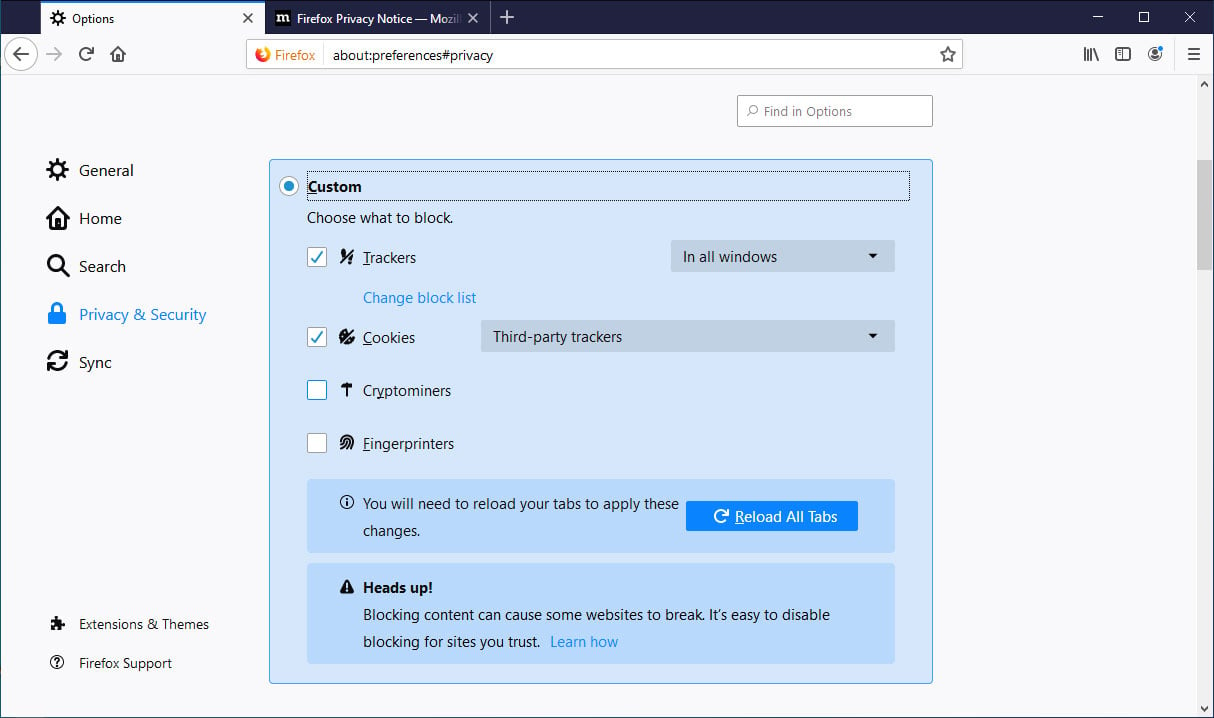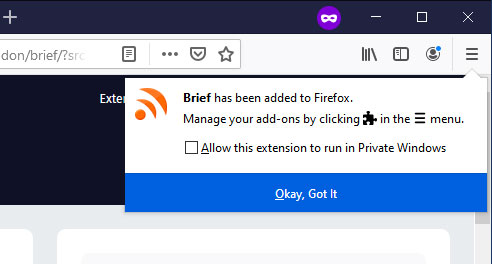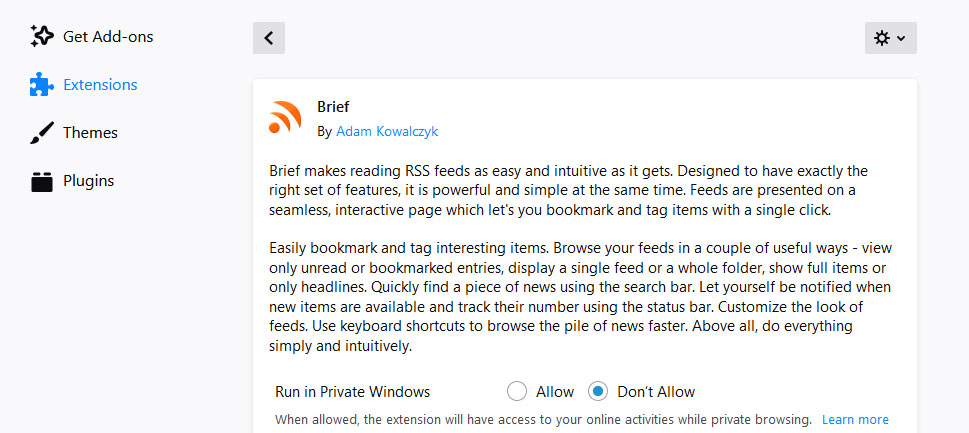
Mozilla has officially released Firefox 67 to the Windows, Mac, Linux, and Android release channels. This version comes with cryptominer and fingerprinter blocking, WebRender, changes to Private Browsing, increased ARM64 support, and improved performance.

The release of Firefox 67 also shifts the other release branches up a version. Now Firefox Beta is version 68 and the Nightly builds are version 69.
You can download Firefox 67 from the following links:
- Firefox 65 for Windows 64-bit
- Firefox 65 for Windows 32-bit
- Firefox 65 for macOS
- Firefox 65 for Linux 64-bit
- Firefox 65 for Linux 32-bit
Below are the major changes in Firefox 67.
Performance improvements
This release includes a variety of performance improvements that will allow Firefox to not only utilize less memory, but also run quicker.
One method used to increase performance is to no longer load or delay loading features that are not necessary to display a web page. This allows the browser to render the page quicker and Mozilla has stated that Instagram, Amazon, and Google searches now execute 40-80% faster.
For those who used extensions to suspend idle tabs in order to save memory, Mozilla now does this automatically. Now when you have less than 400MB memory available, Mozilla will start suspending tabs that have not been used in a while. To enable a page, you can simply click the tab and the browser will reload the page again from where you left off.
Finally, for those who install a lot of extensions, you may find that Firefox would take longer to start. Mozilla has optimized the launching of the browser so that even heavily customized installs launch quickly.
Cryptominer and Fingerprinter blocking comes to Firefox
With this release, the long awaited fingerprinter and cryptomining blocking feature becomes generally available to all Firefox users.
In order to use this feature, users will need to configure Content Blocking to utilize the Custom setting. Once enabled, users can then select to also block Cryptominers and Fingerprinters.

Once enabled, Firefox will automatically block known scripts and domains that utilize in-browser cryptomining and fingerprinting. These new blocking features will not only protect your computer from miners that utilize the CPU of your computer and potentially damage it, but also from fingerprinters that allow sites to identify you based on characteristics of your computer.
While the demise of CoinHive has dramatically reduced the amount of sites utilizing in-browser cryptomining, this is still a useful feature as other companies still offer this service.
Changes in Private Browsing
In Firefox 67, Mozilla has made it easier to enjoy the privacy of Private Browsing without having to give up features you may find useful.
When you use Firefox to store your login credentials for sites, in previous versions you could not access this saved login information in Private Browsing mode. In Firefox 67, Mozilla has made it so you can access all saved credentials even when in Private Browsing mode.
Mozilla has also made changes regarding how browser extensions work in Private Mode. With this release, extensions will not automatically work in Private Mode. Instead, whenever you install a new extension Firefox will ask whether you wish to allow it to run in Private Mode.

For existing extensions, to enable them in private mode, you can go into about:addons, click on extension, and give it permission as shown below.

WebRender being released in small test
Mozilla is also getting ready to release the WebRender rendering engine to a small group of users. This engine will utilize a GPU for 2D rendering of web pages so that browsing the web feels quicker and smoother.
At first, this feature will be rolling out to Windows 10 users using NVIDIA graphics cards. As they test its functionality and resolve issues that come up, they will roll it out to larger groups of users throughout the year.
Full Firefox 67 change log
What's New
-
Enhanced tracking protection: Simplified content blocking settings give users standard, strict, and custom options to control online trackers. A redesigned content blocking section in the site information panel (viewed by expanding the small “i” icon i
-
Firefox 67 demonstrates improved performance thanks to a number of changes such as:
- Lowering priority of
setTimeoutduring page load - Delayed component initialization until after start up
- Painting sooner during page load but less often
- Suspending unused tabs
Learn more about our approach to performance in 67 in the Mozilla blog.
- Lowering priority of
-
Users can block known cryptominers and fingerprinters in the Custom settings of their Content Blocking preferences.
-
Keyboard accessibility has improved in the latest version of Firefox. Toolbar and toolbar overflow menu are both fully keyboard accessible: keyboard users can now access add-ons, the downloads panel, the overflow, Page actions and Firefox menus, and much more.
-
Private Browsing sees both usability and security improvements:
- Save passwords in private browsing mode
- Choose which extensions to exclude from private tabs
-
A myriad of new features help make Firefox easier to use:
- We’ve added a toolbar menu for your Firefox Account to provide more transparency for when you are synced, sharing data across devices and with Firefox. Personalize the appearance of the menu with your own avatar
- Tabs can now be pinned from the Page Actions menu in the address bar
- Firefox will highlight useful features (like Pin Tabs) when users are most likely to benefit from them.
- Easier access to your list of saved logins from the main menu and login autocomplete. Learn about all the ways you can manage your passwords in Firefox.
- The Import Data from Another Browser feature is now also available from the File menu
- Users will be able to run different Firefox installs side by side by default so that you can run the beta and release versions simultaneously
-
Firefox will now protect you against running older versions of the browser which can lead to data corruption and stability issues
-
Firefox is upgrading to the newer, higher performance, AV1 decoder known as ‘dav1d’
-
WebRender is gradually enabled by default on Windows 10 desktops with NVIDIA graphics cards
-
Mozilla’s highest performing JavaScript compiler now supports ARM64 Windows devices.
-
Enable FIDO U2F API, and permit registrations for Google Accounts
-
Some users will see experiments with an improved Pocket experience in Firefox Home with different layouts and more topical content.
Changed:
-
Firefox no longer supports handling webcal: links with 30boxes.com
-
Change to extensions in Private Windows: Any new extensions you add to the browser won’t work in Private Windows unless you allow this in the settings.
-
Users will no longer be able to upload and share screenshots through the Firefox Screenshots server. Users who want to keep existing screenshots need to export them before the server shuts down in the coming months.
-
Included Twemoji Mozilla font updated to support Emoji 11.0
-
Font and date adjustments to accommodate the new Reiwa era in Japan
Developer:
-
The DevTools Changes panel now supports copying modified CSS. You can either copy the full changes or individual changed rules.
-
CSS Viewport-compat - Firefox for Android's mobile viewport behavior is now aligned with other browsers, resolving known compatibility issues with websites.
-
JavaScript module imports - Firefox now supports dynamic module imports.
-
New streamlined worker debugging in the JavaScript Debugger with the new Threads panel.
-
New inline breakpoints provided by the JavaScript Debugger give a much higher fidelity and reliability for pausing in specific locations within a line of code.


Comments
phillytim - 4 years ago
Firefox is simply the best browser out there, and it keeps getting better with each release - especially for privacy, extensions, reliability, speed, and reading mode is awesome!
SuperSapien64 - 4 years ago
Yeah kind of at least for the desktop version but the mobile version is having issues with crackly audio over WiFi when watching videos, well at least on some Android devices.